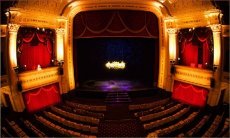New publications
Theater art to the masses: what does the public prefer?
Last reviewed: 01.07.2025

All iLive content is medically reviewed or fact checked to ensure as much factual accuracy as possible.
We have strict sourcing guidelines and only link to reputable media sites, academic research institutions and, whenever possible, medically peer reviewed studies. Note that the numbers in parentheses ([1], [2], etc.) are clickable links to these studies.
If you feel that any of our content is inaccurate, out-of-date, or otherwise questionable, please select it and press Ctrl + Enter.

Theatrical art is unprofitable and requires subsidies to stay afloat. But the theater is criticized not for this, but for the fact that it is supposedly intended exclusively for the economic elite of society.
However, Spanish researchers disagree with this opinion. The results of the study, published in the economic publication "Journal of Cultural Economics", confirm that not only representatives of the intelligentsia go to the theater, but also the working class. However, the preferences of these two classes are different. If the intelligentsia chooses dramatic productions, then people of working professions - comedic ones.
Often, wealthy people's choice of a particular production is based on professional reviews from critics.
"The aim of the study was to identify and analyse demand for theatrical arts. The experts relied on microeconomic research methods. We conducted the survey in two of Newcastle's largest theatres," says the co-author of the study.
Newcastle can safely be called the center of theatrical art. There are different categories of theaters here - from the most modern (like, for example, Northern Stage) to classical ones.
Experts processed questionnaires from 300 study participants.
Survey respondents were presented with a choice of 10 hypothetical scenarios with five different plot developments, each of which was categorised as follows: ticket price (from £7 to £35), theatre category, genre (comedy, drama or experimental production), repertoire (classical, modern or contemporary productions), author (famous or up-and-coming), expert or amateur reviews (reviews on forums or assessments by theatre critics).
To create this questionnaire, experts combined various components of the scripts and came up with ten samples, with the help of which they divided theater lovers into three so-called classes.
43.1% of the survey participants fell into the "affluent" category. They enjoy all types of theatrical art, but still prefer classical productions. In addition, it turned out that people in this category are influenced by reviews and are willing to pay a lot of money for a ticket if the reviews of the performance are positive.
The so-called "working class" includes younger "theatre-goers" and accounts for 25.4% of respondents. This category is satisfied with comedies and unprofessional reviews, and accordingly, their willingness to buy expensive tickets is less.
And finally, the "intellectual" or "cultured" class - 31.5%. They readily attend theatrical productions, preferring drama. Their opinion about a particular play is often formed independently of amateur or professional reviews.
Researchers emphasize that the class of “intellectuals” does not depend on a person’s social status.
Thus, the researchers identified three main categories of people who visit the theater. And although it is believed that theatrical pastime is the lot of the elite, this art form is not alien to other layers of society.
According to experts, the results of this study will be useful, first of all, for marketing companies and for establishing an effective sales policy. In addition, it will help to understand what role the theater plays in our lives.
The research was supported by the UK Government and the Arts and Humanities Research Council.
